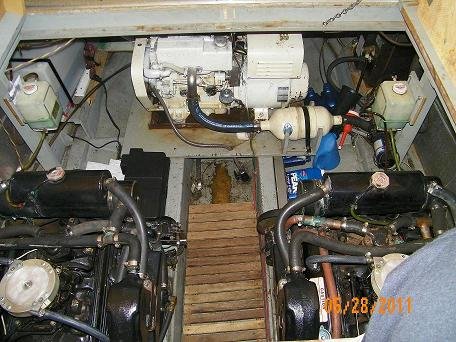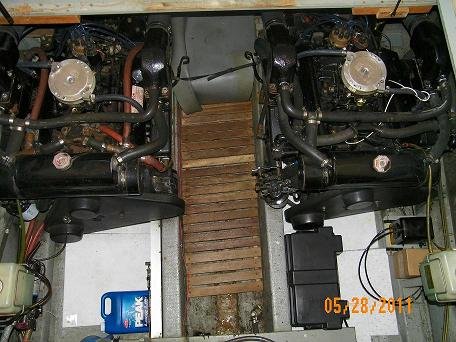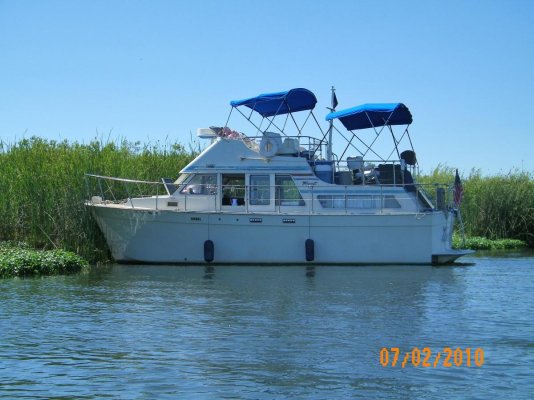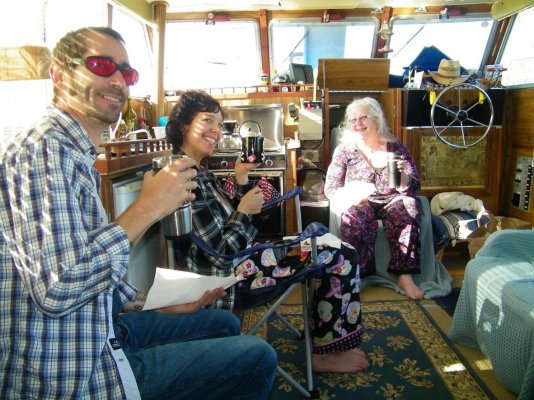You are using an out of date browser. It may not display this or other websites correctly.
You should upgrade or use an alternative browser.
You should upgrade or use an alternative browser.
Gas smell in the cabin, new to inboards.
- Thread starter bshillam
- Start date
The friendliest place on the web for anyone who enjoys boating.
If you have answers, please help by responding to the unanswered posts.
If you have answers, please help by responding to the unanswered posts.
As long as you are into this project you may wish to review your engine/fuel compartment ventilation system. Hard to believe but more than half the gasoline fueled powerboats I survey (including many at the Toronto Boat Show every year) Have fresh air intake ducts connected to the same plenums as blower output ducts !
Take a look at Safe Gasoline Engine Compartment Ventilation
Take a look at Safe Gasoline Engine Compartment Ventilation
One thing about gas smell,once your leak is repaired. Small amounts of chlorine in water will take the gas smell out. Gas has an odor that lingers even though the gas is gone. Chlorine oxidizes the smell. It works wonders
I filled my bilge with water an added a pint of chlorine. Let it set for an hour washed it out and the smell is gone
I filled my bilge with water an added a pint of chlorine. Let it set for an hour washed it out and the smell is gone
Lube oil in gas engines tends to have that sweet sickly fume smell to it also. I don't know what it is about gas fumes and exhaust that is different than diesel but I can tolerate the diesel odors much better.
Humph
Over decades...Having closely looked at for personal survey, been aboard, and owned plenty of boats, gas and diesel... I've found that it is not the type of fuel but rather the condition and cleanliness of engines, fuel tanks, bilge areas, and fuel transfer systems that connote whether a particular craft stinks form fuel it uses or lubes it requires.
In regard to operating exhaust smells, inside/outside the boat: Interior exhaust line condition as well as exterior airflow directions (bringing exhaust from outside to inside boat cavities/portions via windows/doors) as well as engine brand, condition, rpm used, and engine model determines odors at hand.
In other words:
Well kept boats of any type fuel and engine smell fine.

Poorly kept boats simply stink.


Buying a project boat will lead to the unforeseen appearing time and time again. As previously suggested once all the tanks and engine gear are removed you will have a great opportunity to make it right, especially the potentially gas saturated ER wood which is abundant on Tollies. What material were the old tanks and what for new again?
Yesterday I was on a very nice 1989 Tolly 40 sport fisher. DD 400 hp 6 53s with no smell, major oil drips or fuel leaks. The PO was very careful and attentive. But it will need new engines in a few years too, at a lot more cost than the gassers you will put in.
Many good boats have V drives, just be sure those have been gone through too. Enjoy, many of us have been in your shoes wondering what we got into with this old boat.
sc - I'm very interested to learn more, in regard to this qoute from your post: "... especially the potentially gas saturated ER wood which is abundant on Tollies.
Please, do tell - How many gas or diesel boats (Tolly included) have you experienced with fuel (gas/diesel included) ER saturated wood?
To saturate wood with any type fuel means to either immerse said wood for a continued period of time into the fuel... or to spray said wood for a very long period of time with the fuel... to the point where the wood is often dripping wet with fuel and therefore absorbs it.
IMHO – Any boat that has gasoline or diesel fuel saturated ER wood should be well avoided. PO either had a sudden calamity happen or was a complete slob in care for his craft. Also, it seems to me that if ER wood became saturated with gasoline that a BIG BOOM would have previously occurred.
Having been aboard many boats of both fuel types I’ve never seen an ER with fuel (gas or diesel) saturated wood... that includes Tollycraft.
How many Tolly have you been aboard that had gasoline saturated ER wood?? – Just Wondering!
The way I read sunchasers post is, there is a lot of wood on tollies.
Little wood very near engines: Plywood floors and joists are wood as well as reinforced painted plywood base for fuel tanks. A few painted floor posts. Reinforced painted ply for genset base. Ply under-floor bulk head. Stringers have no wood but rather are constructed via closed-cell foam used as a rigid form for extremely well constructed and thick FRP hand woven into Tolly's 1" + thick FRP bottom and transom - no rot ever there!
Interior rooms above floor have much really nice wood. Exterior has virtually none... at least on our year and model Tollycraft... all railing is SS, and we like it! Some other Tolly models have exterior wood... Teak hand rails and the like!
Attachments
bshillam
Guru
- Joined
- May 18, 2013
- Messages
- 801
- Location
- USA
- Vessel Name
- Our Heaven
- Vessel Make
- 1997 4800 Navigator
Holes in the starboard tank = fumes through the ER and salon. Guess this was a good Decision on my part to replace and not use a bandaid! Still not sure about port. That comes out Monday.
bshillam
Guru
- Joined
- May 18, 2013
- Messages
- 801
- Location
- USA
- Vessel Name
- Our Heaven
- Vessel Make
- 1997 4800 Navigator
A sincere thanks goes out to all those that insisted I replace these tanks. I considered for a few minutes that I would focus on other projects. Replacing the lines and hoping that this would have resolved the "smell". I am glad that those few minutes faded and I had a suspicion that there was greater problems. Holes in the tanks = end of life for them. I am sure that it had to do with lack of air movement under the tanks and water entering the ER. (under the tanks) I will be having a higher strip added to the underside of the tanks to correct this issue moving forward. Now to make the wife happy, eliminate gas smell (check), new carpet (check).
FF
Guru
- Joined
- Oct 12, 2007
- Messages
- 22,552
No valves at the pan, no reaching under hot engines.
Sounds good but even metal pipes can fail, do you install a Murphy oil level alarm in the oil pan?
Sounds good but even metal pipes can fail, do you install a Murphy oil level alarm in the oil pan?
Similar threads
- Replies
- 13
- Views
- 703
- Replies
- 75
- Views
- 6K




